 Audiences respectfully satisfied with the first five CinemaScope endeavors, and those who still consider the new wide-screen process a pain in the neck, are due for a mild but highly significant jolt in "The Command," the standard, bantam-weight Western ushered into the Paramount last night with even milder fanfare. And little wonder. For this Warner production follows some formidable,
Audiences respectfully satisfied with the first five CinemaScope endeavors, and those who still consider the new wide-screen process a pain in the neck, are due for a mild but highly significant jolt in "The Command," the standard, bantam-weight Western ushered into the Paramount last night with even milder fanfare. And little wonder. For this Warner production follows some formidable,  personality-laden predecessors. It is sparked by a star of medium voltage, Guy Madison; a middling budget, and a format as old as the hills it scours.
personality-laden predecessors. It is sparked by a star of medium voltage, Guy Madison; a middling budget, and a format as old as the hills it scours.On an average-sized screen, this soldier and Indian package in WarnerColor might play an adequate second fiddle on a double bill. It relates how a young medical recruit circumstantially assumes command of a troop-escorted wagon train and burrows it through the old Wyoming-Territory against all odds. The odds, as stacked by scenarist Russell Hughes, are patently transparent after the first ten minutes or so, from the hostility of the seasoned soldiers and a pretty lady passenger to the yowling tribal ambushes with which, fortunately, the picture is  peppered.However, David Butler's direction has a couple of advantages on his CinemaScope forerunners. One is the towering magnificence of the natural settings, spanning the wide ribbon of screen with cathedral vastness and somehow enveloping the superficialities of this little horse opera like a glove; but never, assuredly, stifling the action.
peppered.However, David Butler's direction has a couple of advantages on his CinemaScope forerunners. One is the towering magnificence of the natural settings, spanning the wide ribbon of screen with cathedral vastness and somehow enveloping the superficialities of this little horse opera like a glove; but never, assuredly, stifling the action. Mr. Butler, in manipulating his wagon train, logically paces and points the trek toward the menace behind the horizon, coiling the soldiers in zig-zag, widening formations, pinpointing the circular wagon
Mr. Butler, in manipulating his wagon train, logically paces and points the trek toward the menace behind the horizon, coiling the soldiers in zig-zag, widening formations, pinpointing the circular wagon  defenses from afar and high above. And he has staged a climactic free-for-all the likes of which has never been seen in the cow country, as a huge, encircling rim of Indians smashes against a wagon barricade.
defenses from afar and high above. And he has staged a climactic free-for-all the likes of which has never been seen in the cow country, as a huge, encircling rim of Indians smashes against a wagon barricade.
 peppered.However, David Butler's direction has a couple of advantages on his CinemaScope forerunners. One is the towering magnificence of the natural settings, spanning the wide ribbon of screen with cathedral vastness and somehow enveloping the superficialities of this little horse opera like a glove; but never, assuredly, stifling the action.
peppered.However, David Butler's direction has a couple of advantages on his CinemaScope forerunners. One is the towering magnificence of the natural settings, spanning the wide ribbon of screen with cathedral vastness and somehow enveloping the superficialities of this little horse opera like a glove; but never, assuredly, stifling the action. Mr. Butler, in manipulating his wagon train, logically paces and points the trek toward the menace behind the horizon, coiling the soldiers in zig-zag, widening formations, pinpointing the circular wagon
Mr. Butler, in manipulating his wagon train, logically paces and points the trek toward the menace behind the horizon, coiling the soldiers in zig-zag, widening formations, pinpointing the circular wagon  defenses from afar and high above. And he has staged a climactic free-for-all the likes of which has never been seen in the cow country, as a huge, encircling rim of Indians smashes against a wagon barricade.
defenses from afar and high above. And he has staged a climactic free-for-all the likes of which has never been seen in the cow country, as a huge, encircling rim of Indians smashes against a wagon barricade.
Needless to say, "The Command" offers little competition by way of class. Mr. Madison is amiable enough as the protagonist. Joan Weldon makes a competent reward for his ordeal. And Ray Teal, Bob Nichols and Don Shelton fill minor parts competently. James Whitmore and Carl Benton Reid, however, in their respective ways, are as estimable as the scenery. The customers who manage to keep their scalps on may wonder why it has taken CinemaScope so long to appraise our own big backyard as never before.
THE COMMAND, screen play by Russell Hughes as adapted by Samuel Fuller from a James Warner Bellah novel: produced by David Weisbart and directed by David Butler for Warner Brothers. At the Paramount.
Captain MacClaw . . . . . Guy Madison
Sergeant Elliot . . . . . James Whitmore
Martha . . . . . Joan Weldon
Colonel Janeway . . . . . Carl Benton Reid
Gottschalk . . . . . Harvey Lembeck
Dr. Trent . . . . . Ray Teal
O'Hirons . . . . . Bob Nichols
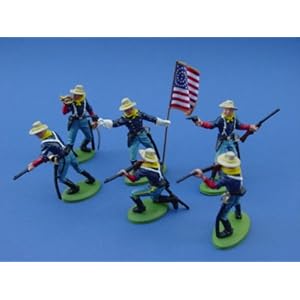
Major Gibbs . . . . . Don SheltonBorn Robert Moseley on January 19, 1922, in Bakersfield, California, Guy Madison never planned to be an actor; the handsome star fell into it quite by accident. Madison had been a telephone lineman, but with the onset of World War II, he went into the Coast Guard. During a weekend leave in 1943, one of David O. Selznick's talent scouts spotted Madison, who was attending a broadcast of a popular radio program. The result of this was a small role in the wartime drama Since You Went Away (1944; with Claudette Colbert and Joseph Cotten); Madison completed his scene during a 48-hour pass, and then went back on duty. Folling the release of Since You Went Away,below playmate Dolores Donlon girlfriend of Madison

Selznick's studio was overwhelmed with fan mail for the handsome 22-year-old. Madison finished his tour of duty in 1946 and immediately went back to Hollywood to capitalize on his newfound fame. RKO Studios signed him to a contract upon his return. Throughout the late 1940s, Madison honed his craft mostly by acting in smaller theater productions, 

making few movies during that time. He was the subject of numerous beefcake photographs while building a film persona. one of the hottest young actors of the 1940s.  Blessed with a beautiful face and physique (and marginal talent), .
Blessed with a beautiful face and physique (and marginal talent), .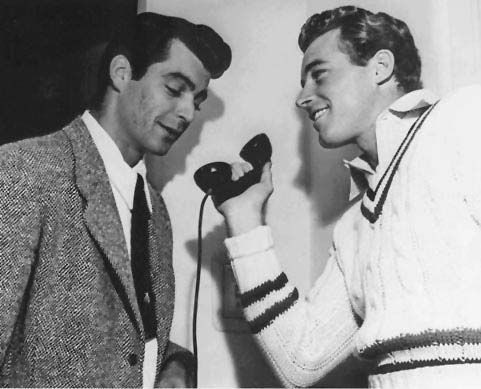 the actor was renamed Guy Madison by infamous gay talent scout Henry Willson, who "discovered" him while the young Navy cadet was attending a radio broadcast in Hollywood.
the actor was renamed Guy Madison by infamous gay talent scout Henry Willson, who "discovered" him while the young Navy cadet was attending a radio broadcast in Hollywood.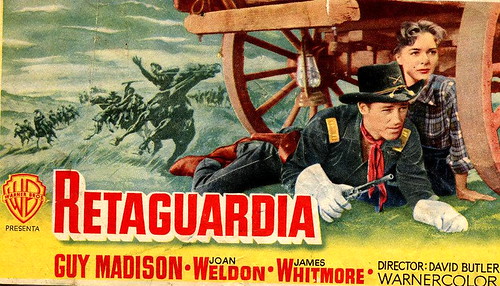
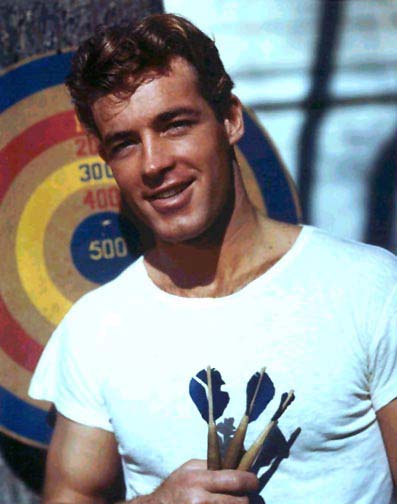 Henry Willson would later discover and name Rock Hudson, Troy Donahue,
Henry Willson would later discover and name Rock Hudson, Troy Donahue, Tab Hunter,
Tab Hunter,
 and Rory Calhoun,
and Rory Calhoun, among others. According to Robert Hofler's recent book about the infamous Mr. Willson (The Man Who Invented Rock Hudson), he mostly picked gay men and sampled the merchandise as part of the auditioning process. The book states that Madison was one of these, and even alleges a hot sex scene in a car
among others. According to Robert Hofler's recent book about the infamous Mr. Willson (The Man Who Invented Rock Hudson), he mostly picked gay men and sampled the merchandise as part of the auditioning process. The book states that Madison was one of these, and even alleges a hot sex scene in a car henry Willson started off as a talent scout under powerhouse mogul David O. Selznick, for whom Willson procured women. The starmaker-to-be was therefore on the lookout for promising newcomers—as actors, lovers and sometimes both—when he received an unsolicited photograph from a movie star hopeful named Roy Scherer. Unbeknownst to Willson, the photograph of the handsome young man with bad teeth would have not only a career-defining impact for himself but, more importantly, redefine Hollywood’s concept of the male heartthrob. Roy Scherer became Rock Hudson and for the next twenty-five years Henry Wilson became the man behind movie “beefcake.”
henry Willson started off as a talent scout under powerhouse mogul David O. Selznick, for whom Willson procured women. The starmaker-to-be was therefore on the lookout for promising newcomers—as actors, lovers and sometimes both—when he received an unsolicited photograph from a movie star hopeful named Roy Scherer. Unbeknownst to Willson, the photograph of the handsome young man with bad teeth would have not only a career-defining impact for himself but, more importantly, redefine Hollywood’s concept of the male heartthrob. Roy Scherer became Rock Hudson and for the next twenty-five years Henry Wilson became the man behind movie “beefcake.”
 Blessed with a beautiful face and physique (and marginal talent), .
Blessed with a beautiful face and physique (and marginal talent), . the actor was renamed Guy Madison by infamous gay talent scout Henry Willson, who "discovered" him while the young Navy cadet was attending a radio broadcast in Hollywood.
the actor was renamed Guy Madison by infamous gay talent scout Henry Willson, who "discovered" him while the young Navy cadet was attending a radio broadcast in Hollywood.
 Henry Willson would later discover and name Rock Hudson, Troy Donahue,
Henry Willson would later discover and name Rock Hudson, Troy Donahue, Tab Hunter,
Tab Hunter,
 among others. According to Robert Hofler's recent book about the infamous Mr. Willson (The Man Who Invented Rock Hudson), he mostly picked gay men and sampled the merchandise as part of the auditioning process. The book states that Madison was one of these, and even alleges a hot sex scene in a car
among others. According to Robert Hofler's recent book about the infamous Mr. Willson (The Man Who Invented Rock Hudson), he mostly picked gay men and sampled the merchandise as part of the auditioning process. The book states that Madison was one of these, and even alleges a hot sex scene in a car henry Willson started off as a talent scout under powerhouse mogul David O. Selznick, for whom Willson procured women. The starmaker-to-be was therefore on the lookout for promising newcomers—as actors, lovers and sometimes both—when he received an unsolicited photograph from a movie star hopeful named Roy Scherer. Unbeknownst to Willson, the photograph of the handsome young man with bad teeth would have not only a career-defining impact for himself but, more importantly, redefine Hollywood’s concept of the male heartthrob. Roy Scherer became Rock Hudson and for the next twenty-five years Henry Wilson became the man behind movie “beefcake.”
henry Willson started off as a talent scout under powerhouse mogul David O. Selznick, for whom Willson procured women. The starmaker-to-be was therefore on the lookout for promising newcomers—as actors, lovers and sometimes both—when he received an unsolicited photograph from a movie star hopeful named Roy Scherer. Unbeknownst to Willson, the photograph of the handsome young man with bad teeth would have not only a career-defining impact for himself but, more importantly, redefine Hollywood’s concept of the male heartthrob. Roy Scherer became Rock Hudson and for the next twenty-five years Henry Wilson became the man behind movie “beefcake.”The Man Who Invented Rock Hudson delves into Willson’s life in explicit, unsparing detail. Variety reporter Robert Hofler deftly chronicles Willson’s maneuvers to sidestep the FBI's investigation into Hudson's sex life; the starmaker's use of off-duty L.A.P.D. cops and Mob ties to scare off Hudson's blackmailers; Hudson's "arranged" marriage to Willson's secretary, Phyllis Gates; as well as Hudson’s affair with a Universal Pictures vice-president to help secure starring roles in Magnificent Obsession and Giant. Additionally, the book digs into Willson’s other star clients, including Robert Wagner, Troy Donahue, Tab Hunterduring a rainstorm in which Rory Calhoun is screwing Madison.

(As this book is so sketchily documented, most of the scurrilous stories cannot be substantiated. But it's still fun to fantasize about! And, lest we forget, Henry Willson's secretary was the bride chosen by Rock Hudson during his brief marriage to counter the The critics descended on this turkey with knives flashing, calling Madison wooden and inept. His follow-up filmHoneymoon
 with Shirley Temple was equally panned by one and all.
with Shirley Temple was equally panned by one and all.

 with Shirley Temple was equally panned by one and all.
with Shirley Temple was equally panned by one and all.Madison's movie career was on the wane when he married starlet Gail Russell. The gorgeous Russell had starred in such hits as The Uninvited and Our Hearts Were Young and Gay. But her career was on the skids due to her increasing dependence on alcohol. The lovely and talented Ms. Russell was intensely shy and totally lacking in self-confidence. She turned to alcohol to help her during filming. The marriage lasted 5 years and they were divorced when 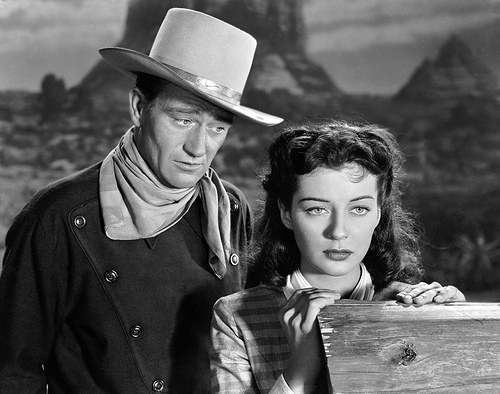

Madison could no longer deal with Russell's problems.
 In the early ‘50s Madison's fortunes improved as he starred in the hit TV series The Adventures of Wild Bill Hickok. After this series ended Madison married and divorced again (with 3 daughters), and went to Europe where he did a bunch of low budget Italian films.
In the early ‘50s Madison's fortunes improved as he starred in the hit TV series The Adventures of Wild Bill Hickok. After this series ended Madison married and divorced again (with 3 daughters), and went to Europe where he did a bunch of low budget Italian films. 
Guy Madison was a good actor OR MAYBE NOT, but anyone looking at his photos and footage from his first movies would agree that even if he was one gorgeous hunk to those interested he was also, maybe, a product of the corrupt sexual star system of hollywood that involved homosexual and non who gave men and women starring roles because of their screwability,disgusting but the public never really cared if someone could act or not.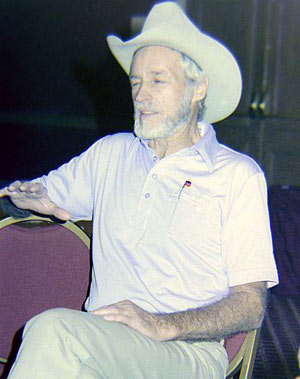



MADISON SAW MILITARY SERVICE IN WW2 UNLIKE JOHN WAYNE WHO STAYED HOME.People like MADISON WERE NO WORSE AS REGARDS MASCULINITY THAN PEOPLE LIKE jOHN WAYNE WHO 

ESCHEWED THE HERO BUT NEVER JOINED UP IN WW2.
. If only he had the talent to go with it. Regardless, Madison was able to parlay his God-given gifts into a career that lasted over twenty years.rampant gay rumors that were swirling about him as he became a star in the 1950's.)

No comments:
Post a Comment